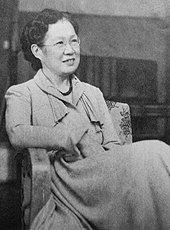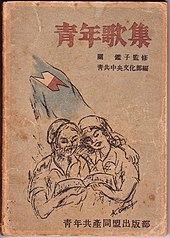Seki Akiko
Seki Akiko ( Japanese 関 鑑 子 ; born September 8, 1899 in Tokyo , died May 2, 1973 there ) was a Japanese soprano and choir conductor . She became known as the founder of the social and political movement The Singing Voice of Japan ( Japanese 日本 の う た ご え Nihon no Utagoe or う た ご え 運動 Utagoe-undō , English The Singing Voice of Japan ), which ideologically corresponds to communism or democratic socialism followed. In 1955 she was awarded the International Stalin Peace Prize.
life and work
Seki Akiko was born in Tokyo in 1899. She studied art singing and graduated in March 1921 from the Tokyo Music Academy ( 東京 音 楽 学校 Tōkyō Ongaku Gakkō ). On the first May Day after the war in Tokyo, she conducted Die Internationale and a Japanese version of the socialist song The Red Flag . Building on this experience, she started the movement The Singing Voice of Japan . On February 10, 1948, she founded the Choir of the Communist Youth Movement of Japan ( 日本 青年 共産 同盟 中央 合唱 団 Nihon-seine-kyōsan-dōmei Chūō-gasshōdan , English Choir of the Communist Youth League of Japan ) as the core of a socially political national music movement of the working class. On November 29, 1953, the first national festival of the Singing Voice of Japan took place in Tokyo in the Hibiya Kōkaidō ( 日 比 谷 公会 堂 ) and the Kanda Kyōristu Kōdō ( 神 田 共 立 講堂 ).
On December 20, 1955, she was awarded the International Stalin Prize for strengthening peace between the peoples , together with Lázaro Cárdenas (1934–1940 President of Mexico ), Mohamed al-Aschmar , Joseph Wirth (1921/22 Chancellor of the Weimar Republic ), Tôn Đức Thắng and Ragnar Forbeck .
Publications
- 「青年 歌集」 Seinen-kashū (Tokyo, Typography of the cultural section of the Communist Youth League of Japan, 1948). A collection of songs for the youth
- 「歌 ご え に 魅 せ ら れ て」 Utagoe ni miserarete , Enchanted by the Singing Voice (Tokyo, 1971).
supporting documents
- ^ A b NDL Search Various Authors: Ōkina benibara . (Tokyo, 1981) [ 関 鑑 子 追想 集 編 集 委員会 編 「大 き な 紅 ば ら: 関 鑑 子 追想 集」 (音 楽 セ ン タ ー 1981 年) 関 鑑 子 略 年譜 ]
- ↑ Seki Akiko: Theory of The Singing Voice of Japan : What is the music (Tokyo, 1956), p.58. [ 関 鑑 子 「う た ご え 運動 の 理論 - 音 楽 と は 何 か -」 (「知性」 1956 年 増 刊号 [東京 、 河 出 書房]) 58 ペ ー ジ ]
- ↑ О присуждении международных Сталинских премий «За укрепление мира между народами» за 1955 год . In: Pravda , December 21, 1955, p. 1.
- ↑ NDL Search [ 「歌 ご え に 魅 せ ら れ て」 (音 楽 セ ン タ ー 1971 年) ]
Web links
- Recording of the voice of Seki Akiko , greeting the audience at the Festival of the Singing Voice of Japan in Nippon Budōkan , November 1968. 関 鑑 子 の 話声 録音 - 1968 年 日本 の う た ご え 祭典 祭典 ・ 大 音 楽 会 で の 挨 拶 (日本 武 道 館に て) (Japanese)
- Official website of the National Council of the Singing Voice of Japan 日本 の う た ご え 全国 協議 会 ホ ー ム ペ ー ジ (Japanese)
- Journal of the Singing Voice of Japan (Japanese)
| personal data | |
|---|---|
| SURNAME | Seki, Akiko |
| ALTERNATIVE NAMES | 関 鑑 子 (Japanese) |
| BRIEF DESCRIPTION | Japanese soprano and choir conductor |
| DATE OF BIRTH | September 8, 1899 |
| PLACE OF BIRTH | Tokyo |
| DATE OF DEATH | May 2nd 1973 |
| Place of death | Tokyo |

